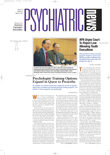With the ongoing controversy surrounding objective reporting of all clinical trial results— both negative and positive—study results should be viewed in context.
Many questions have been raised over potential bias based on a study's source of funding.
The research reported here, comparing the Texas Medication Algorithm Project (TMAP) guideline for the treatment of depression with a“ treatment as usual” approach, may be skeptically received in light of allegations earlier this year regarding significant funding from multiple pharmaceutical companies to the TMAP consortium of investigators.
In February it was reported, first in the New York Times, that“ 10 drug companies chipped in to help underwrite the initial effort by Texas state officials to develop the [TMAP] guidelines.” The report also noted that “other companies paid for meetings around the country at which officials from various states were urged to follow the lead of Texas.” Indeed, these allegations are the root of a“ whistleblower” lawsuit in Pennsylvania regarding drug company payments to state officials, allegedly aimed at getting the state to adopt the guidelines, which the suit alleges promote the use of newer, more-expensive, medications over older, less-expensive generics.
According to numerous reports, TMAP received a total of $285,000 from 11 pharmaceutical companies for start-up of the project. In the development of the guidelines for depression, schizophrenia, bipolar disorder, ADHD, and pediatric depression, TMAP to date has spent more than $6 million. The list of funding sources is long, but is included in its entirety in the TMAP depression study reported here.
The current study was funded by the National Institute of Mental Health, along with numerous foundations (including the Robert Wood Johnson Foundation—separate from Johnson & Johnson, but founded by the estate of the long-time CEO), the Texas Department of Mental Health and Mental Retardation, the federal Center for Mental Health Services, and the Department of Veterans Affairs, as well as many others. Numerous pharmaceutical companies contributed unrestricted educational grants to the TMAP depression study.
As psychiatrists and mental health professionals review the TMAP depression algorithm report and attempt to put the results in context, they will likely be reminded of the complexity of conducting a large, multicenter clinical trial in today's research environment.
